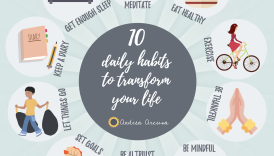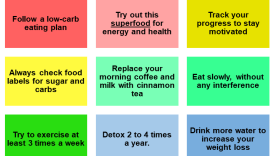10 Key Steps to Kickstart Your Healthy Lifestyle Plan

Importance of Prioritizing Health
In our fast-paced world, it’s easy to put health on the back burner. Many people prioritize work, social engagements, and everyday commitments over personal well-being. However, choosing to prioritize health is crucial. It allows individuals to not only feel better physically but also enhances mental clarity and emotional stability. For instance, someone who adjusts their schedule to fit in regular exercise and balanced meals often notices improvements in energy levels, mood, and productivity.
- 10 Key Steps to Kickstart Your Healthy Lifestyle Plan
- Importance of Prioritizing Health
- Benefits of a Healthy Lifestyle
- Set Your Goals
- Defining Clear Objectives
- Establishing Realistic Targets
- Evaluate Your Current Habits
- Identifying Unhealthy Practices
- Understanding Your Lifestyle Choices
- Create a Balanced Diet Plan
- Incorporating Nutrient-Rich Foods
- Meal Prepping for Success
- Stay Hydrated
- Importance of Water Intake
- Hydration Tips for Everyday Life
- Exercise Regularly
- Finding an Exercise Routine That Works
- Incorporating Physical Activity Into Your Day
- Prioritize Sleep
- Impact of Sleep on Health
- Establishing a Sleep Schedule
- Manage Stress Levels
- Recognizing Stress Triggers
- Implementing Stress-Relief Techniques
- Build a Support System
- Surrounding Yourself with Positive Influences
- Seeking Professional Help When Needed
- Monitor Your Progress
- Tracking Your Health and Lifestyle Changes
- Adjusting Your Plan for Success
Benefits of a Healthy Lifestyle
Embracing a healthy lifestyle can yield numerous benefits that go beyond just weight management. Here are some advantages:
- Enhanced Mental Clarity: Regular physical activity and a balanced diet can boost cognitive functions.
- Increased Energy Levels: When the body receives proper nutrition and exercise, it operates more efficiently.
- Improved Mood: Healthy habits can lead to higher serotonin levels, reducing anxiety and depression.
- Longer Lifespan: Consistent healthy choices contribute to longevity and a higher quality of life.
Incorporating these elements into daily life enables individuals to thrive, making health a foundational aspect of overall happiness.
Set Your Goals
Defining Clear Objectives
Once individuals recognize the value of prioritizing health, the next step is to set specific and clear objectives. Defining clear health-related goals can serve as a roadmap, guiding daily decisions and actions. For example, rather than simply aiming to “get fit,” one could set a goal to “exercise for 30 minutes, five times a week.” This specific target makes it easier to track progress and stay motivated.
Establishing Realistic Targets
Next, it’s essential to establish realistic targets. Setting overly ambitious goals can lead to frustration and burnout. Instead, start with manageable steps, such as:
- Week 1: Walk 10 minutes daily.
- Week 2: Increase to 15 minutes, adding five minutes each week.
- Month 1: Aim for two home-cooked meals per week.
These incremental goals not only promote success but also cultivate confidence along the journey. By taking it one step at a time, individuals are more likely to maintain their commitment and create lasting habits.
Evaluate Your Current Habits
Identifying Unhealthy Practices
After setting clear and realistic goals, the next vital step is to evaluate current habits. This can often reveal unhealthy practices that might be sneaking into daily routines. For instance, many people may not realize how often they indulge in sugary snacks or skip workouts. By keeping a journal for a week, you can identify patterns and choices that may not align with your health objectives.
- Are you consuming caffeine late in the day affecting your sleep?
- Is fast food becoming a regular meal option?
- How often do you choose sedentary activities over physical ones?
Understanding Your Lifestyle Choices
Understanding the reasons behind these choices is equally essential. Often, unhealthy habits stem from stress, time constraints, or even social influences. For example, if you find yourself grabbing takeout every night due to a busy schedule, it might be time to assess meal planning strategies. Reflecting on these aspects provides valuable insights, allowing individuals to create a tailored plan that effectively addresses their unique circumstances and leads to healthier choices.
Create a Balanced Diet Plan
Incorporating Nutrient-Rich Foods
With a clear understanding of current habits, it’s time to craft a balanced diet plan. The first step is incorporating nutrient-rich foods into everyday meals. A diet filled with whole foods not only fuels the body but also supports overall well-being. You might consider including:
- Fruits and Vegetables: Aim for a colorful variety to ensure a range of vitamins and minerals.
- Whole Grains: Options like quinoa, brown rice, and oats provide fiber and energy.
- Lean Proteins: Incorporate beans, chicken, or fish to support muscle health.
- Healthy Fats: Avocados, nuts, and olive oil benefit heart health.
Meal Prepping for Success
To make healthy eating easier, meal prepping is a game-changer. By spending a few hours on the weekend to prepare meals, individuals can avoid last-minute unhealthy choices during the week. Consider:
- Batch Cooking: Make a large pot of soup or casserole that can be portioned for several meals.
- Snack Packs: Prepare healthy snacks in advance, like sliced veggies or mixed nuts.
- Containers: Invest in reusable containers to organize meals and reduce food waste.
By being proactive and organized, sticking to a balanced diet becomes not just achievable but enjoyable. Planning ahead allows for creativity in the kitchen while ensuring health goals are met with delicious, nutritious options.
Stay Hydrated
Importance of Water Intake
After establishing a balanced diet plan, the next key focus should be hydration. Staying hydrated is crucial for overall health; our bodies are composed of roughly 60% water, affecting everything from digestion to cognitive function. A personal anecdote: after increasing my water intake, I noticed a significant boost in energy levels – no more afternoon slumps! Inadequate hydration can lead to fatigue, headaches, and even impair physical performance. Keeping an adequate water intake helps to:
- Regulate body temperature
- Maintain joint lubrication
- Aid in nutrient absorption
Hydration Tips for Everyday Life
Here are some practical tips to ensure you stay hydrated throughout the day:
- Carry a Water Bottle: Having a reusable bottle on hand makes it easier to drink more water.
- Set Reminders: Use your phone or apps that alert you to drink water at regular intervals.
- Flavor It Up: If plain water doesn’t excite you, add slices of lemon, cucumber, or mint for a refreshing twist.
- Track Your Intake: Use a journal or app to monitor daily water consumption to ensure you’re meeting your goals.
By making hydration a priority, individuals can significantly enhance their physical and mental performance, paving the way for a healthier lifestyle.
Exercise Regularly
Finding an Exercise Routine That Works
Having prioritized hydration, the next focus should be on establishing a regular exercise routine. Finding a workout that fits your lifestyle and preferences is key to making it sustainable. Think about what activities you enjoy – perhaps dancing, swimming, or hiking? For instance, I discovered that while I love running, I also enjoy yoga, which adds balance to my routine. Here are a few tips to help find the right exercise plan:
- Experiment with Various Activities: Try different classes or sports until you find what resonates with you.
- Set a Schedule: Aim for a consistent time each week dedicated to your workouts, treating them as important appointments.
- Start Small: If you’re new to exercise, begin with 20-30 minutes a few times a week to ease into it.
Incorporating Physical Activity Into Your Day
In addition to dedicated exercise sessions, it’s vital to incorporate physical activity into daily life. Simple adjustments can make a big difference:
- Take the Stairs: Opt for stairs instead of elevators whenever possible.
- Walk or Bike: Consider walking or biking for errands instead of driving.
- Active Breaks: During work hours, take short breaks to stretch or walk around the office.
By seamlessly blending exercise into your routine, staying active becomes less of a chore and more of an enjoyable lifestyle choice. This consistency not only enhances fitness but also boosts overall health and mood.
Prioritize Sleep
Impact of Sleep on Health
With a balanced diet and regular exercise in place, it is crucial not to overlook the importance of sleep in the overall wellness equation. Sleep impacts every aspect of health, influencing mood, cognitive function, and even immune system strength. When I started prioritizing my sleep, I noticed not only improved focus during the day but also a more optimistic outlook. Studies show that lack of sleep can lead to:
- Increased stress levels
- Elevated risk of chronic conditions
- Impaired decision-making and memory
Making sleep a priority is essential for maintaining both mental and physical health.
Establishing a Sleep Schedule
To reap the benefits of sleep, establishing a consistent sleep schedule is vital. Here are some actionable tips to help you get started:
- Set a Regular Bedtime: Try to go to bed and wake up at the same time every day, even on weekends.
- Create a Wind-Down Routine: Develop calming pre-sleep rituals, like reading or meditating, to signal to your body that it’s time to relax.
- Limit Screen Time: Reduce exposure to screens at least an hour before bedtime to help improve sleep quality.
By fostering healthy sleep habits, individuals can enhance their well-being and enjoy the fruits of their hard work towards a healthier lifestyle.
Manage Stress Levels
Recognizing Stress Triggers
With the foundation of sleep, exercise, and nutrition established, the next crucial aspect of a healthy lifestyle is managing stress levels. Recognizing stress triggers is the first step towards effective management. Everyone has different stressors—whether it’s a busy work schedule, family obligations, or even financial concerns. For example, I realized that my stress often spiked during certain times of the month at work, leading to late nights and anxiety. By identifying specific patterns, I could focus on strategies to mitigate stress. Here are some common triggers to watch out for:
- Tight deadlines
- Social obligations
- Interpersonal conflicts
Implementing Stress-Relief Techniques
Once stressors are identified, it’s time to implement stress-relief techniques. Finding what works best for you is key. Here are some effective methods to manage stress:
- Mindfulness and Meditation: Practicing mindfulness exercises, even for a few minutes a day, can enhance relaxation.
- Physical Activity: Incorporating movement, like a brisk walk or yoga session, can help clear your mind.
- Creative Outlets: Engaging in hobbies, such as painting or playing music, provides a wonderful distraction.
By actively managing stress levels, individuals can maintain their well-being and enjoy a more balanced, fulfilling life. Consistent self-awareness and proactive techniques will empower you to navigate challenges with greater ease.
Build a Support System
Surrounding Yourself with Positive Influences
With tools for managing stress in place, the importance of a support system cannot be overstated. Surrounding yourself with positive influences is essential for maintaining motivation and emotional health. Friends, family, and even colleagues can uplift you during challenging times. For instance, when I decided to embark on a healthier lifestyle, my friends joined me in workouts and meal prep sessions, making it a fun and supportive experience. Consider these tips for fostering a positive support network:
- Engage with Like-Minded Individuals: Join clubs or groups that share your health and wellness interests.
- Communicate Openly: Share your goals with your network; they can offer encouragement and accountability.
- Limit Negative Interactions: Distance yourself from those who perpetuate negativity or hinder your progress.
Seeking Professional Help When Needed
Sometimes, relying on friends and family isn’t enough. It’s perfectly acceptable to seek professional help when stress, anxiety, or other mental health challenges arise. Therapists or counselors can provide valuable insights and coping strategies tailored to your individual needs. Consider:
- Therapy or Counseling: Professional guidance can help navigate emotional challenges or behavioral changes.
- Support Groups: Sharing experiences with others facing similar challenges can foster understanding and motivation.
By proactively building a strong support system, you’ll have the resources needed to thrive on your journey towards a healthier and happier life. Emphasizing connections and professional help is vital in maintaining balance and resilience.
Monitor Your Progress
Tracking Your Health and Lifestyle Changes
As you focus on building a support system, it’s essential to monitor your progress on this health journey. Tracking your health and lifestyle changes can provide insights into what’s working and what may need adjustment. Keeping a journal or using apps dedicated to health tracking can make this process easier. For instance, when I first started my fitness journey, I recorded my workouts, meals, and hydration levels. This practice helped me stay accountable and motivated, revealing trends over time. Consider tracking:
- Workout Consistency: Log your exercise sessions to spot patterns in your activity levels.
- Mood and Energy Levels: Note how changes in diet or exercise influence your overall well-being.
- Health Metrics: Track metrics such as weight, body measurements, or even blood pressure.
Adjusting Your Plan for Success
Once you have a clear picture of your progress, it’s time to adjust your plan for success. Flexibility is key; what works at one stage of your journey may need to evolve as you grow. Here are some strategies for effective adjustments:
- Reassess Your Goals: If you’ve hit a plateau, consider setting new short-term goals to reignite your motivation.
- Incorporate Variety: Spice up your workout routine or meal plan to prevent boredom and stimulate progress.
- Seek Feedback: Don’t hesitate to consult your support system or professionals for insights on optimizing your approach.
By actively monitoring your progress and making necessary adjustments, you empower yourself to stay aligned with your health goals and adapt to the ever-changing landscape of your wellness journey. This proactive mindset is essential for long-term success and fulfillment.





